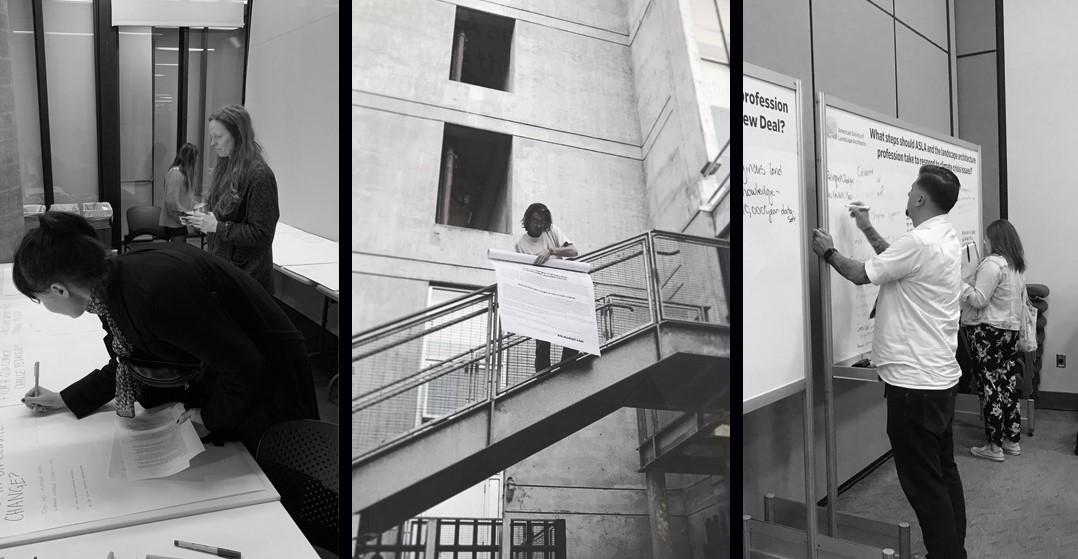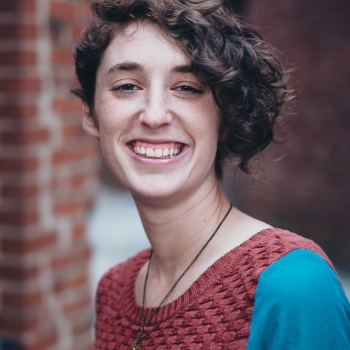Join our mailing list and receive invitations to our events and updates on our research in your inbox.
Generation Climate Crisis
If we are to survive the climate crisis and implement the Green New Deal, the younger generations will have to do it—and it is going to take all of us. Our survival will require close collaboration between different areas of expertise: climate science, ecology, hydrology, sociology, technology, policy, politics, economics, planning, and design. For designers, reaching beyond our specific disciplinary boundaries will expand our knowledge while also teaching others about the potentials of design. In personal pursuit of building bridges between disciplines here at the University of Pennsylvania and reaching out to landscape architecture students across the country, I connected with two different groups of engaged young people, resulting in two new initiatives: ASLAadapt and Climate Leaders at Penn.
ASLAadapt: Breaking the cycle of competition
Traditional design culture relies heavily on fostering competition between peers. Because of this, perceptions of eliteness tend to dominate decisions regarding what school to attend and what firm to work for. But the climate crisis doesn’t give two shits about the Ivy League. Humanity is locked in a real-life escape room; we can either work together—fast—or perish.
ASLAadapt began when a group of grad students from different design programs decided to throw out the cycle of competition keeping us from working together to halt the destruction of our planet. The collective began as a collaboration of landscape architecture students from across the country with the goal of writing a letter caling upon our professional association to do better in this time of climate crisis. We asked ASLA to endorse—and help define—the Green New Deal; assert our commitment to the public realm; and advocate for climate science, both in curricula and in licensure.
The letter has been so far been signed by over five hundred students, teachers, and practitioners, and was presented in full at the “Designing the Green New Deal” conference in Philadelphia in September 2019. Since the conference, encouragement for the letter from other professionals has increased, and ASLA made space for the conversation at the 2019 Conference on Landscape Architecture in San Diego. There we again called on ASLA to support the Green New Deal; on November 18 the Society announced their support for the newly released Green New Deal for Public Housing Act. And subsequently, the CEO Roundtable pushed Landscape Architecture Magazine to publish our letter.
Since then, ASLAadapt has begun a toolkit to help local student working groups develop at design schools; one such group, based at Harvard, is preparing a roaming exhibit of climate-related design work from landscape students across the country (submission information is included below). Follow us on twitter or visit ASLAadapt.com to keep up on our progress—and take part in our youth movement to shift the direction of landscape architecture.
Climate Leaders at Penn: Challenging meritocracy and picking our own leaders
Somehow, in a world of growing inequality, and despite a growing societal awareness of race, gender, and class privilege, the myth of “meritocracy”—a nineteen-fifties vision of hard work, entrepreneurialism, and bootstraps—refuses to die. Our current “merit-based” power structures incentivize old leaders to select new leaders who look, think, speak, and act like them. In the context of the climate crisis, this means that the generations who caused, and benefited most from, the destruction of the environment are likely to groom leaders who will perpetuate their destructive system.
And so we who will suffer from the climate crisis must select our own leaders. And we must build solidarity across disciplinary boundaries—because the scale of the climate crisis will overwhelm the capacity of any specific knowledge system or professional methodology. These recognitions were the genesis of a second student group: Climate Leaders at Penn. Students in environmental science, law, medicine, business, and design meet regularly to discuss education, advocacy and community initiatives—to build bridges across departments, ending the siloing of graduate students within their hermetically sealed academic departments, and to raise the voices of student leaders.
Earth Day 2020: Student teach-in
These two groups will come together for Earth Day 2020 to highlight crucial student climate work—by undergraduates and graduate students, from academic departments across the University of Pennsylvania and all over the United States. This modern-day teach-in will culminate in a conversation between Daniel Aldana Cohen, Kate Aronoff, Mary Annaïse Heglar, and other climate leaders, centered on the urgent new book A Planet to Win: Why We Need a Green New Deal. Drawing on the strength of these new organizations, we’ll be creating a space where students—the new generation of climate game-changers—will be able to learn from each other, make connections, and begin to redesign our world.
How to get involved:
ASLAadapt
We're hoping that you'll submit one or more projects you completed as part of studio coursework or competitions while in school. The work will be exhibited at the GSD Kirkland Gallery in 11" × 17" format, organized around keywords chosen by each entrant. The work will also be hosted online at landscapeclimatearchive.net, where visitors will be invited to suggest their own keywords.
If you’re interested, please find a template, an example document, and a release form at this Google Drive folder, and send your submission to aslaadapt.gsd@gmail.com. Save for incomplete submissions, all entries will be exhibited. Multiple submissions encouraged! Our goal is to collect and document as many climate ideas as young designers are producing today.
Climate Leaders at Penn
If you’re interested in learning about or participating in Climate Leaders at Penn, please email Katie Pitstick at pitstick@design.upenn.edu or Sid Radhakrishna at sidrad@wharton.upenn.edu.We are hoping to make board member selections by late February.
*Editor's Note: This article was edited to reflect the collaborative nature of the organization's founding*

